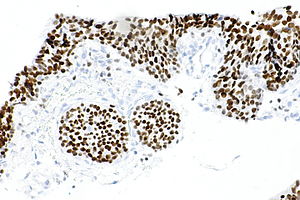Difference between revisions of "GATA3"
Jump to navigation
Jump to search
| Line 6: | Line 6: | ||
| Abbrev = | | Abbrev = | ||
| Synonyms = | | Synonyms = | ||
| Similar = | | Similar = [[thrombomodulin]] | ||
| Clones = | | Clones = | ||
| Use = bladder versus prostate, bladder versus SCC | | Use = bladder versus prostate, bladder versus SCC | ||
Revision as of 16:09, 3 June 2016
| GATA3 | |
|---|---|
| Immunostain in short | |
 GATA3 staining in benign urothelium. | |
| Similar stains | thrombomodulin |
| Use | bladder versus prostate, bladder versus SCC |
| Subspeciality | Genitourinary pathology, Breast pathology |
| Normal staining pattern | nuclear |
| Positive | urothelial carcinoma, invasive ductal carcinoma of the breast, lobular breast carcinoma |
| Negative | prostatic carcinoma, squamous cell carcinoma of the lung |
GATA3 an immunostain that is increasingly used in genitourinary pathology.
Positive
- Urothelial carcinoma.[1]
- Breast carcinoma - more sensitive than GCDFP-15.[2]
- Chromophobe renal cell carcinoma ~50% of cases.[2]
Images
Negative
See also
References
- ↑ 1.0 1.1 1.2 Chang A, Amin A, Gabrielson E, et al. (October 2012). "Utility of GATA3 immunohistochemistry in differentiating urothelial carcinoma from prostate adenocarcinoma and squamous cell carcinomas of the uterine cervix, anus, and lung". Am. J. Surg. Pathol. 36 (10): 1472–6. doi:10.1097/PAS.0b013e318260cde7. PMC 3444740. PMID 22982890. https://www.ncbi.nlm.nih.gov/pmc/articles/PMC3444740/.
- ↑ 2.0 2.1 Miettinen, M.; McCue, PA.; Sarlomo-Rikala, M.; Rys, J.; Czapiewski, P.; Wazny, K.; Langfort, R.; Waloszczyk, P. et al. (Jan 2014). "GATA3: a multispecific but potentially useful marker in surgical pathology: a systematic analysis of 2500 epithelial and nonepithelial tumors.". Am J Surg Pathol 38 (1): 13-22. doi:10.1097/PAS.0b013e3182a0218f. PMID 24145643.
- ↑ Ellis, CL.; Chang, AG.; Cimino-Mathews, A.; Argani, P.; Youssef, RF.; Kapur, P.; Montgomery, EA.; Epstein, JI. (Nov 2013). "GATA-3 immunohistochemistry in the differential diagnosis of adenocarcinoma of the urinary bladder.". Am J Surg Pathol 37 (11): 1756-60. doi:10.1097/PAS.0b013e31829cdba7. PMID 24061521.